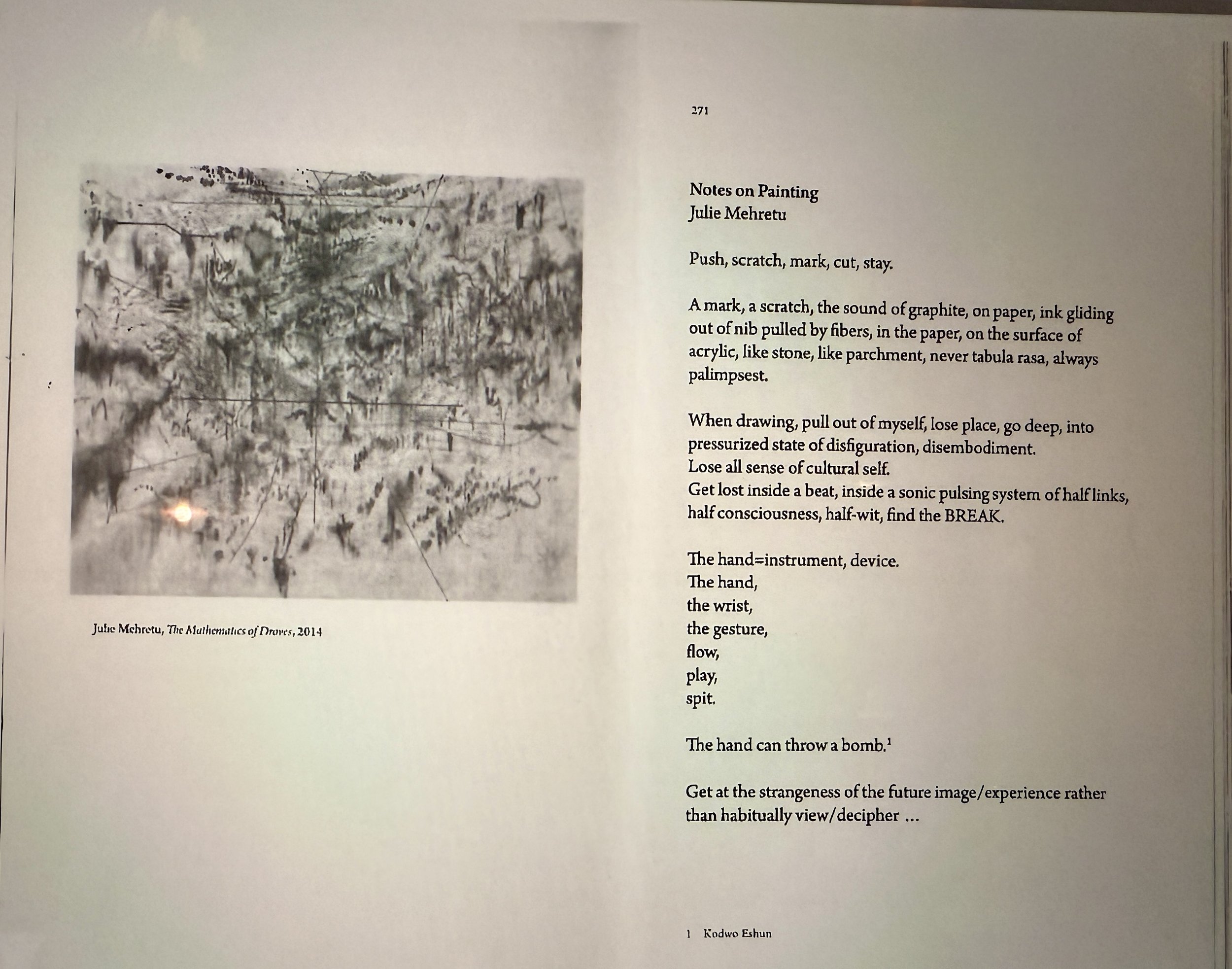(my) Notes on (How to make a) Painting
My response to Julie Mehretu's poem, Notes on Painting.
Door closes. Kids gone. Dog walked. A Wash on.
Time to think, time to make = studio time. THINK! Enter that room where there is room to think. The back bedroom studio. Enter and close the door. Un-pause the discussions in your head. But be quick. Think quick, quickly even.
Pace the room, lay out canvas, dampen, mix, pour, guide, direct, protect. Assess. Mop up a bit. Needs time to dry.
Move on, Mull fabric, open weave/grid, unfold, lay on canvas, glue, brush, smear, hands are getting sticky. Pour dye. Colour. Needs time to dry.
Sewing machine out, dodgy old thing. Thread, pin, prepare, clear dining room table. Polyester, silk, mull, glides through. Two layers of canvas though makes hard work. Keep going faithful machine. Zig-zagy is fine. Just get to the end of the line.
PUSH – be brave, I want to do something extra-ordinary! But where is my voice, what am I trying to say. I’m not actually sure. I just need to do this. Speak up. I feel a bit numb. I feel a bit dumb. Push through. Go and put the kettle on, what are we going to have for dinner? Quick sweep the kitchen floor. Too many pets & dark wood floors. Must get back to the room but the wash cycle has STOPPED. It will get very creased if left.
Kill the Angel in the House.[1]
Becoming a mother meant becoming the child and mothering that child in the way you wanted to be mothered. But then you are both mother and child. Divine? But how can that work. Colouring-in and drawing, for hours. Always proudly within the lines. You could be a cartographer, but what’s a cartographer? Now colouring outside the lines feels good but is it the action of the mother or child.
Penelope: I am no mother, I am no bride, I am KING.[2] I shrank myself to the size of a bird in the hand of a man.[3] That’s Wifedom.[4] For many of us.
Find the break, the gap, the fissures, undoing and pulling apart – open force of unraveling potentiality…Painting as performative time. But never tabula rasa, always palimpsest.[5] How has your day been?
Pull at threads to make a hole. Penelope again. Unpick something inside, that every year of being knitted, the purl and plain of life gone muddled, and different from the dreamed neatness.[6] Making and unmaking; unravelling. Everything falls apart, Things Fall Apart.[7] No Longer at Ease.[8]
Men-oh-PAUSE. Pause to think, I AM NOT DONE. Or am I done? I am a bit tired. I used to do stuff, be someone. (But did I really…) I can’t remember.
The hubris of Arachne, imagine! She weaved a superior scene of inferior scenes. Got caught up in her own web. An old woman appears = MAMAN[9]. Art as defiance, exposure, revelation. Condemned to weave forever, join the club, mutters Sisyphus. Art as physical labour. Process but no product. It’s a thankless task.
The magic power of the needle - used to repair damage, historical damage. It's a claim to forgiveness. It is never aggressive; it's not a pin.[10]
Needle, pin, PRICK, tongue gone, Philomela. Though Philomela lost her love [!!], fresh note she warbleth yes again, fa la la la la.[11] We must tell our stories, speak up, weave ourselves back into history. White thread, white ink, écriture féminine[12], invisible until discovered. [UV]. Jug, Jug, Tereu.[13] WE MUST TAKE UP SPACE.
The sun is shining. Quick, hang that washing out.
[1] Virginia Woolf’s essay, Killing the Angel in the House, 1931.
[2] Florence + the Machine, Dance Fever album, King, 2024.
[3] Carol Ann Duffy’s poetry collection, The World’s Wife, Thetis, 2024.
[4] Anna Funder novel, Wifedom, about George Orwell’s wife (who helped write his novels)
[5] Julie Mehretu, Notes on Painting,
[6] Janet Frame, Owls Do Cry, 19??
[7] Julie Mehretu, Notes on Painting,
[8] Chinua Achebe, No Longer at Ease, second in the Trilogy, (Things Fall Apart being the first),1960. I studied this trilogy.
[9] Louise bourgeois sculpture
[10] Louise Bourgeois quote
[11] Thomas Morely’s conzonets to Three Voices, No. 23 Though Philomela Lost Her Love. 1593. I sang this as a school girl.
[12] Helene Cixous, The Laugh of the Medussa, 1957.
[13] 17th-century poet Richard Barnefield, Nightingale Song.



